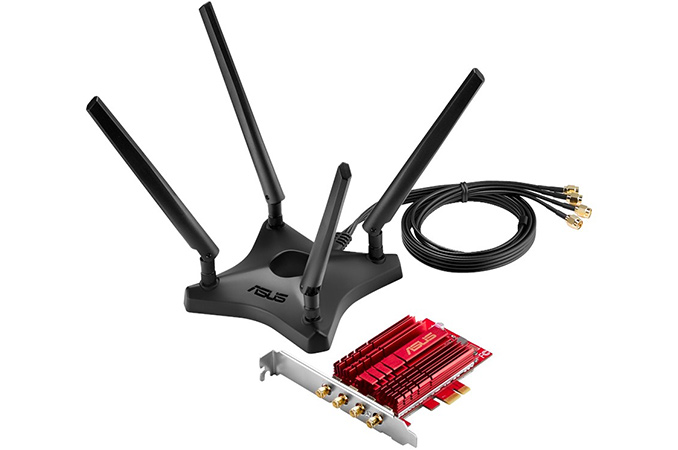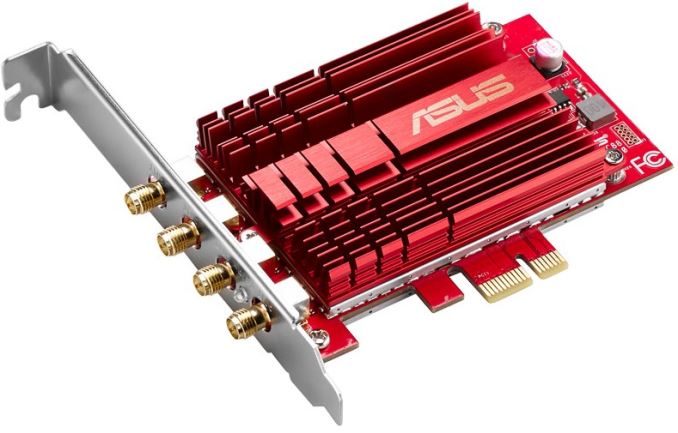ASUS Unveils PCE-AC88 4x4 Wi-Fi Card with 2167 Mbps Bandwidth
by Anton Shilov on May 11, 2016 11:00 AM EST- Posted in
- Networking
- Asus
- Broadcom
- 802.11ac
- PCIe x1

ASUS has introduced its flagship dual-band AC3100 wireless PCIe x1 adapter with four antennas and a maximum supported throughput of 2167 Mbps (270 MB/s). The card is powered by Broadcom’s flagship 802.11ac Wave 2 system-on-chip for Wi-Fi adapters and to show its best, it has to be connected to a router featuring another high-end Broadcom SoC.
The ASUS dual-band AC3100 wireless (PCE-AC88) PCIe adapter is based on the Broadcom BCM4366 SoC introduced early last year. The BCM4366 supports 4x4 802.11ac MU-MIMO technology and can thus use four 802.11n (2.4 GHz/5 GHz) or four 802.11ac (5 GHz) streams. The PCE-AC88 is a small half-height card that features PCIe x1 interface (the Broadcom chip supports PCIe 3.0, but exact data rate of the card is not given) and is equipped with a large big red cooler, and it is particularly large compared to other WiFi heatsinks. The device features four RP-SMA connectors for antennas as well as a special external magnetic base for the antennas which may be installed on top of a desktop PC or positioned somewhere else for better radio performance.
To actually hit the maximum bandwidth, the card has to be connected to routers powered by Broadcom’s latest Wi-Fi SoCs that support TurboQAM (256 quadrature amplitude modulation) and NitroQAM (1024 quadrature amplitude modulation) technologies. For pairing, ASUS currently offers its AC3100 (RT-AC88U) and AC5300 (RT-AC5300) routers, which support both TurboQAM and NitroQAM features. Netgear offers its Nighthawk X8 R8500 AC5300 router, which also supports maximum bandwidth up to 2167 Mbps.
The ASUS PCE-AC88 card was approved by the FCC in late November 2015, and is currently listed on ASUS’ website. The product is ready and may emerge for sale anytime, but its price is still unknown. Keeping in mind that the ASUS PCE-AC68 costs around $95, we expect the newest and fastest one to be at a higher price.
At present, the ASUS dual-band AC3100 wireless (PCE-AC88) PCIe adapter seems to be the only add-in Wi-Fi card for desktops which supports speeds up to 2167 Mbps using a 4x4 SoC. The part should come in handy for various media center PCs or NAS environments where wired Ethernet is absent but can benefit from high network speeds.
Source: ASUS (via TechPowerUp).
















26 Comments
View All Comments
JoeyJoJo123 - Wednesday, May 11, 2016 - link
Where can I get an RP-SMA antenna mount like the one that's included in this picture (the black thing holding the four antennas).I'm trying to position antennas in a better location than what is possible by sticking next to the digital cable coax port on the wall that's conveniently in a terrible location, which restricts where I can setup a modem+router, which therefore makes it that much more difficult to get good wifi signal strength.
Murloc - Wednesday, May 11, 2016 - link
why not just get 4 single antenna mounts and glue them to something?JoeyJoJo123 - Wednesday, May 11, 2016 - link
Because it's not an elegant of a solution than getting a single triple antenna mount, which coincidentally is almost impossible to find.djc208 - Thursday, May 12, 2016 - link
I have a triple antenna setup with magnetic base and those connectors I got off of Newegg a few years ago when I was trying to set up a wireless receiver in a detached building to connect to the Wi-Fi in my house. Wasn't very expensive and works well. Allowed me to route the antennas from the card in the machine up to a higher point for better reception.ikachu1 - Wednesday, May 11, 2016 - link
Bleh, hopefully ASUS supports this card in Win10 better than they have the PCE-AC68. Even with the latest drivers (released in December) I get a blue screen if I try to torrent something.jasonelmore - Wednesday, May 11, 2016 - link
lower incoming/outgoing connection count.heffeque - Wednesday, May 11, 2016 - link
Buying a "state of the art" PCI wifi card... just to have to lower the connection count. Might as well buy a crappy wifi card if it isn't going to work any better.Major_Kusanagi - Wednesday, May 11, 2016 - link
It's not only the PCE-AC68 that has this issue- My (2015) Dell XPS 13 has the same problem with blue-screening from torrenting.Michael Bay - Thursday, May 12, 2016 - link
What are you torrenting with, exactly?There is no trust in clients after what uTorrent pulled off, maybe you`re dealing with something alike.
Techguy123 - Wednesday, May 11, 2016 - link
Don't use the latest one use ASUS PCE-AC68 utility 2.0.8.8. It's the one that works perfectly. There are a few things you need to do - change the start registry key Hkey_Local_Machine\System\ControlSet001\Services\BCM42RLY from the value 3 to the value 4 in Hex. That stops the missing file spamming in event viewer. Disable beamforming in Asus utility and then disable start up in task manager as you really need it. I found beamforming causes latency spikes.